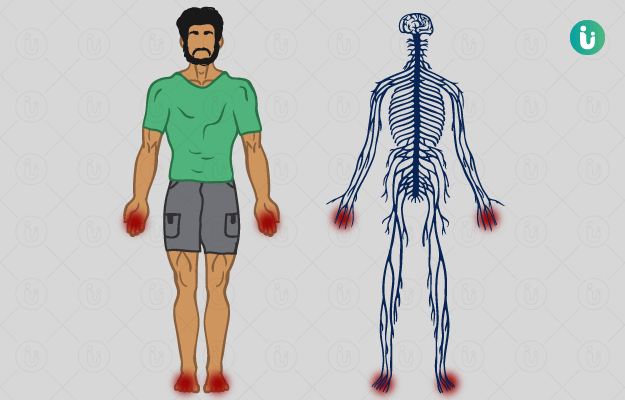What is peripheral neuropathy?
The peripheral nervous system is a communication system within the body which involves the exchange of signals between the central nervous system, viz. brain and spinal cord, and other parts of the body. These signals may include sensory messages like cold hands, signals for muscle contraction which help in body movement, and others. Damage to the peripheral nervous system is called peripheral neuropathy.
What are its main signs and symptoms?
The signs and symptoms may vary based on which nerve is damaged.
- Damage to the motor nerve
It causes muscle cramps, muscle weakness, twitching and shrinking of the muscle. - Damage to the sensory nerve
It causes an inability to feel sensations like touch, pain and temperature changes, and difficulty in motor coordination like walking, fastening buttons, etc. - Damage to the autonomic nerve
It causes altered sweating, heat intolerance, and other problems related to internal organs.
What are the main causes?
The most prevalent cause of peripheral neuropathy is diabetes. Other causes include health conditions listed below:
- Decreased levels of vitamins.
- Injury to the nerves.
- Alcohol addiction.
- Infections like Lyme disease and diphtheria.
- Inflammation of the blood vessels.
- Chronic liver disease.
- Chronic kidney disease.
- Rheumatoid arthritis.
- HIV, herpes and varicella-zoster virus infections.
- Excessive toxins like arsenic, mercury and lead in the body.
How is it diagnosed and treated?
The diagnosis of peripheral neuropathy involves the following:
- Blood test to detect diabetes or vitamin deficiency.
- Nerve conduction tests.
- Imaging techniques like X-ray, CT scan and magnetic resonance imaging (MRI) test.
- Electromyography.
- Nerve biopsy.
Treatment of peripheral neuropathy is done by treating the cause as well as managing the symptoms. The following are the commonly used methods of treatment:
- Treating and managing diabetes.
- Injections or oral supplements of vitamins.
- Stopping the intake of a medicine, if it is the cause.
- Corticosteroids.
- Immunoglobulin injections.
- Immunosuppressants.
- Medications like painkillers to treat the nerve pain.
- Wearing socks and shoes at all times helps prevent injuries to the foot due to reduced sensations.

 Doctors for Peripheral Neuropathy
Doctors for Peripheral Neuropathy  OTC Medicines for Peripheral Neuropathy
OTC Medicines for Peripheral Neuropathy



















